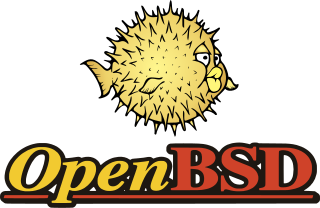In computing, traceroute and tracert are computer network diagnostic commands for displaying possible routes (paths) and measuring transit delays of packets across an Internet Protocol (IP) network. The history of the route is recorded as the round-trip times of the packets received from each successive host in the route (path); the sum of the mean times in each hop is a measure of the total time spent to establish the connection. Traceroute proceeds unless all sent packets are lost more than twice; then the connection is lost and the route cannot be evaluated. Ping, on the other hand, only computes the final round-trip times from the destination point.
Intermediate System to Intermediate System is a routing protocol designed to move information efficiently within a computer network, a group of physically connected computers or similar devices. It accomplishes this by determining the best route for data through a packet switching network.
Open Shortest Path First (OSPF) is a routing protocol for Internet Protocol (IP) networks. It uses a link state routing (LSR) algorithm and falls into the group of interior gateway protocols (IGPs), operating within a single autonomous system (AS). It is defined as OSPF Version 2 in RFC 2328 (1998) for IPv4. The updates for IPv6 are specified as OSPF Version 3 in RFC 5340 (2008). OSPF supports the Classless Inter-Domain Routing (CIDR) addressing model.
The Routing Information Protocol (RIP) is one of the oldest distance-vector routing protocols which employs the hop count as a routing metric. RIP prevents routing loops by implementing a limit on the number of hops allowed in a path from source to destination. The largest number of hops allowed for RIP is 15, which limits the size of networks that RIP can support.
PF is a BSD licensed stateful packet filter, a central piece of software for firewalling. It is comparable to netfilter (iptables), ipfw, and ipfilter.

The Optimized Link State Routing Protocol (OLSR) is an IP routing protocol optimized for mobile ad hoc networks, which can also be used on other wireless ad hoc networks. OLSR is a proactive link-state routing protocol, which uses hello and topology control (TC) messages to discover and then disseminate link state information throughout the mobile ad hoc network. Individual nodes use this topology information to compute next hop destinations for all nodes in the network using shortest hop forwarding paths.
Netatalk is a free, open-source implementation of the Apple Filing Protocol. It allows Unix-like operating systems to serve as file server for Macintosh computers. Historically Netatalk implemented the AppleTalk protocol suite, allowing Unix-like operating systems to serve also as print and time servers for Apple Macintosh computers.

XORP is an open-source Internet Protocol routing software suite originally designed at the International Computer Science Institute in Berkeley, California. The name is derived from eXtensible Open Router Platform. It supports OSPF, BGP, RIP, PIM, IGMP, OLSR.
Zebra is a routing software package that provides TCP/IP based routing services with routing protocols support such as RIP, OSPF and BGP. Zebra also supports special BGP Route Reflector and Route Server behavior. In addition to traditional IPv4 routing protocols, Zebra also supports IPv6 routing protocols. With SNMP daemon which supports SMUX protocol, Zebra provides routing protocol management information bases.
The Common Address Redundancy Protocol or CARP is a computer networking protocol which allows multiple hosts on the same local area network to share a set of IP addresses. Its primary purpose is to provide failover redundancy, especially when used with firewalls and routers. In some configurations, CARP can also provide load balancing functionality. CARP provides functionality similar to VRRP and to Cisco Systems' HSRP. It is implemented in several BSD-based operating systems and has been ported to Linux (ucarp).

OpenBGPD, also known as OpenBSD Border Gateway Protocol Daemon, is a server software program that allows general purpose computers to be used as routers. It is a Unix system daemon that provides a free, open-source implementation of the Border Gateway Protocol version 4. This allows a machine to exchange routes with other systems that speak BGP.
There are a number of Unix-like operating systems based on or descended from the Berkeley Software Distribution (BSD) series of Unix variant options. The three most notable descendants in current use are FreeBSD, OpenBSD, and NetBSD, which are all derived from 386BSD and 4.4BSD-Lite, by various routes. Both NetBSD and FreeBSD started life in 1993, initially derived from 386BSD, but in 1994 migrating to a 4.4BSD-Lite code base. OpenBSD was forked from NetBSD in 1995. Other notable derivatives include DragonFly BSD, which was forked from FreeBSD 4.8, and Apple Inc.'s iOS and macOS, with its Darwin base including a large amount of code derived from FreeBSD.
A network socket is a software structure within a network node of a computer network that serves as an endpoint for sending and receiving data across the network. The structure and properties of a socket are defined by an application programming interface (API) for the networking architecture. Sockets are created only during the lifetime of a process of an application running in the node.
Quagga is a network routing software suite providing implementations of Open Shortest Path First (OSPF), Routing Information Protocol (RIP), Border Gateway Protocol (BGP) and IS-IS for Unix-like platforms, particularly Linux, Solaris, FreeBSD and NetBSD.

FreeBSD is a free and open-source Unix-like operating system descended from the Berkeley Software Distribution (BSD), which was based on Research Unix. The first version of FreeBSD was released in 1993. In 2005, FreeBSD was the most popular open-source BSD operating system, accounting for more than three-quarters of all installed simply, permissively licensed BSD systems.

OpenBSD is a security-focused, free and open-source, Unix-like operating system based on the Berkeley Software Distribution (BSD). Theo de Raadt created OpenBSD in 1995 by forking NetBSD. According to the website, the OpenBSD project emphasizes "portability, standardization, correctness, proactive security and integrated cryptography."

OpenSSH is a suite of secure networking utilities based on the Secure Shell (SSH) protocol, which provides a secure channel over an unsecured network in a client–server architecture.
Free Range Routing or FRRouting or FRR is a network routing software suite running on Unix-like platforms, particularly Linux, Solaris, OpenBSD, FreeBSD and NetBSD. It was created as a fork from Quagga. FRRouting is distributed under the terms of the GNU General Public License v2 (GPL2).




